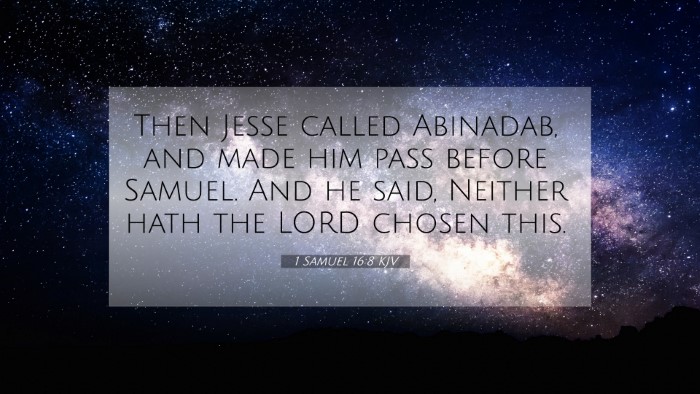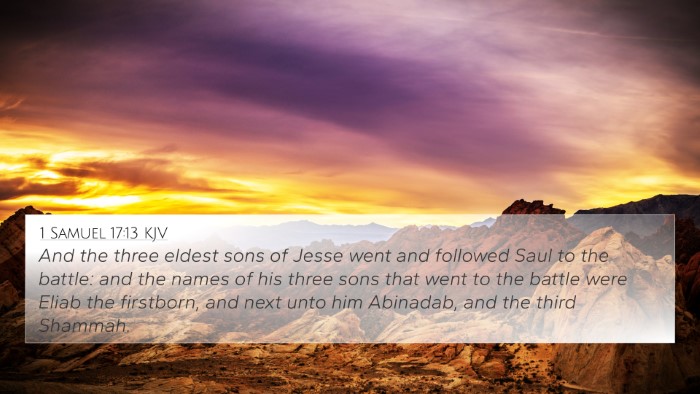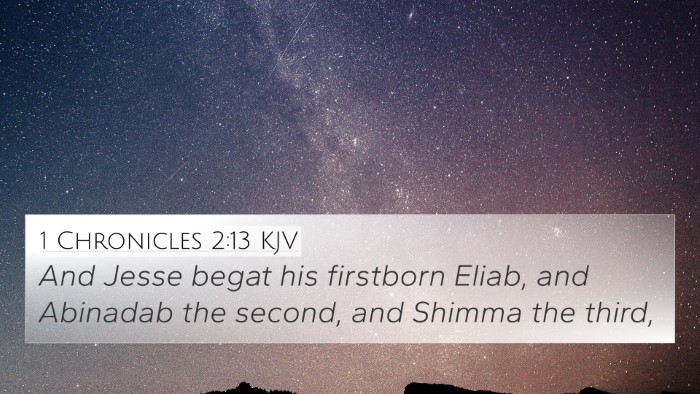Understanding 1 Samuel 16:8
The verse 1 Samuel 16:8 states:
"Then Jesse called Abinadab and made him pass before Samuel. And he said, 'Neither has the LORD chosen this one.'" (1 Samuel 16:8, ESV)
This moment occurs during a pivotal narrative in the Old Testament, where God directs the prophet Samuel to anoint a new king of Israel, replacing Saul, the current monarch. In this context, Jesse presents his sons to Samuel to determine which one is the chosen successor.
Summarized Meaning from Commentaries
Insights from Matthew Henry
Henry emphasizes the significance of the divine selection process. As each son of Jesse passes before Samuel, it becomes evident that outward appearances or traditional expectations do not dictate God's choices. Each of Jesse's sons represents attempts to conform to human standards of leadership, yet the LORD's choice reveals His propensity to look at the heart rather than outward stature or lineage.
Insights from Albert Barnes
Barnes focuses on the theme of divine rejection and selection. Samuel, acting on God's instruction, had to discern who among Jesse's sons possessed the qualities God seeks in a leader. The rejection of each son until David is introduced highlights God's sovereign will and the contrast between human selection and divine purpose.
Insights from Adam Clarke
Clarke notes the emotional weight of this moment for Samuel. The prophet was initially unsure and struggled with God’s rejection of Saul and the implications of anointing a new king. This moment also reflects on Jesse’s faith in presenting his sons, perhaps unaware of God’s ultimate plan in choosing David—a shepherd destined to become a king.
Key Themes in 1 Samuel 16:8
- Divine Choice: The verse underscores God's prerogative in choosing leaders based on inner character.
- Rejection of the Unworthy: This verse highlights that not all who appear noble are chosen; God’s standards differ from human judgment.
- Faith and Obedience: Samuel’s obedience to God’s directive is a theme seen throughout the narrative as it sets the stage for the anointing of David.
- Human Limitations: The moment serves as a reminder of human blindness to divine insight. We must seek wisdom to see beyond the surface.
Cross-References to Consider
- 1 Samuel 16:7: "But the LORD said to Samuel, 'Do not look on his appearance or on the height of his stature, because I have rejected him...'" - Highlighting God's focus on the heart.
- 1 Samuel 10:1: "Then Samuel took a flask of oil and poured it on his head and kissed him and said, 'Has not the LORD anointed you to be prince over his people?'" - The prior anointing of Saul sets the context for David's future role.
- Psalm 78:70-72: "He chose David his servant and took him from the sheepfolds..." - This psalm reflects on God's choice of David as a leader.
- Acts 13:22: "And when he had removed him, he raised up David to be their king, of whom he testified and said, 'I have found in David...'" - The New Testament acknowledges God's selection of David.
- 1 Peter 2:9: "But you are a chosen race, a royal priesthood, a holy nation..." - Extending the concept of divine choice to believers.
- Matthew 7:16: "You will recognize them by their fruits." - Emphasizing that true character is revealed through actions.
- Romans 9:16: "So then it depends not on human will or exertion, but on God, who has mercy." - The principle that God's selection is rooted in His mercy and purpose.
Connecting Themes Across Scriptures
The concepts captured in 1 Samuel 16:8 resonate throughout Scripture, showcasing a recurring theme: God’s choice vs. human expectation. Connecting these verses enriches our understanding of biblical narratives and propels deeper study.
Starting with Cross-Referencing
Tools for Bible cross-referencing, such as concordances and thematic guides, can help believers navigate relationships between various scriptures. A cross-reference Bible study enriches knowledge and inspires faith through comparative analysis of similar themes, such as leadership, divine integrity, and personal character.
Application in Modern Faith
As we reflect on 1 Samuel 16:8, we are invited to consider how the divine choice applies today. How do we discern God’s leading in our lives, and do we take time to seek His input beyond the surface-level analysis of situations and people?
Conclusion
The essence of 1 Samuel 16:8 is a powerful reminder of God's sovereignty and perspective. The rejection faced by Jesse's sons illustrates that the divine selection criteria differ vastly from human standards. As believers, we are called to embrace this understanding, understanding that in God's kingdom, the heart's posture ultimately governs His choices.




